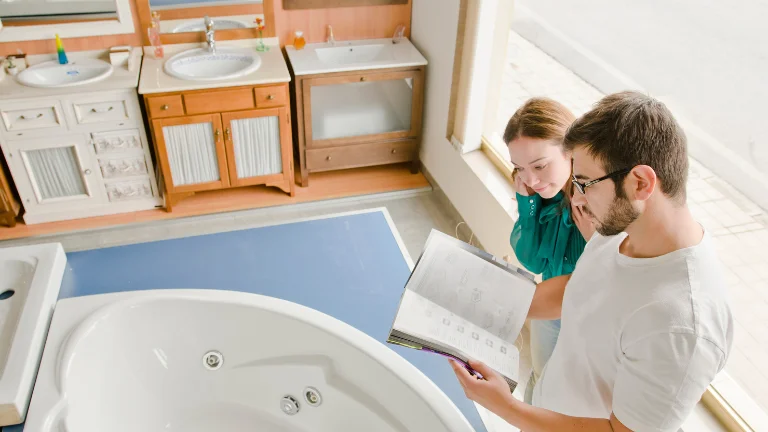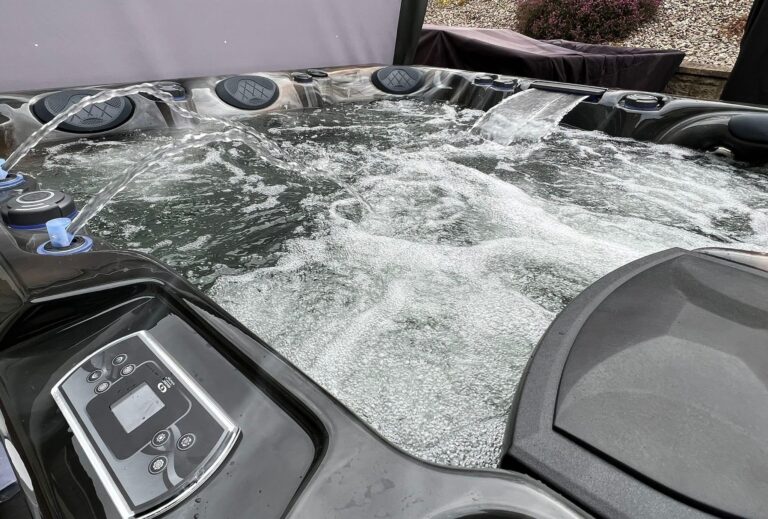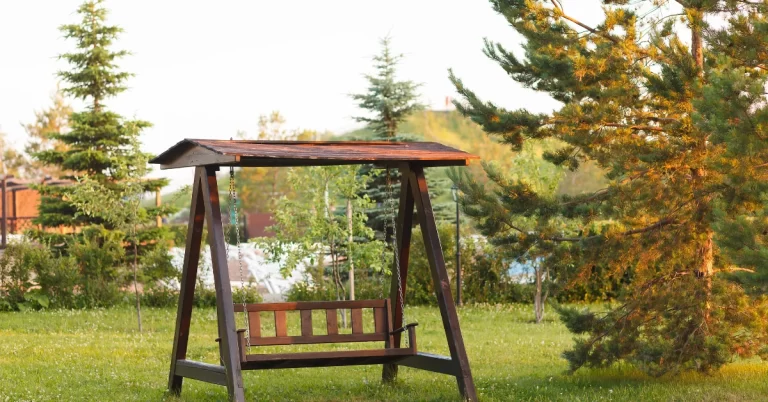Hot Tub Repair vs. Replacement
Deciding between repairing or replacing your hot tub before selling your home? Learn key factors, cost considerations, and the impact on your property’s value to make the best choice. Visit Hot Tub Patio for expert tips and advice.
When selling your home, you might wonder whether to repair or replace your hot tub. The right decision can boost your property’s value and appeal. Here’s a guide to help you make the best choice.
Assess the Condition
1. Age of the Hot Tub: If your hot tub is over 10-15 years old, it might be nearing the end of its lifespan. Older models can be less energy-efficient and harder to find parts for.
2. Extent of Damage: Minor issues like small leaks, a broken pump, or cosmetic damage can be repaired relatively easily. However, major problems like severe shell cracks, failing electrical systems, or extensive internal leaks might warrant replacement.
3. Usage Frequency: Consider how often the hot tub has been used. Heavy use can accelerate wear and tear, leading to more frequent repairs.
Cost Considerations
1. Repair Costs: The cost of repairing a hot tub can range from $100 for minor fixes to over $1,000 for significant repairs. It’s essential to get a professional assessment to understand the exact costs.
2. Replacement Costs: A new hot tub can cost anywhere from $3,000 to $15,000, depending on the model and features. Consider this investment against the potential increase in home value and buyer appeal.
Impact on Home Value
1. Enhanced Curb Appeal: A well-maintained hot tub can be a selling point, making your home more attractive to buyers looking for relaxation and luxury amenities. Highlighting this feature can set your property apart from others on the market.
2. Energy Efficiency: Newer hot tubs are more energy-efficient and come with better warranties, which can be a strong selling point. They also tend to have modern features that appeal to tech-savvy buyers.
Get tips on selling your home quickly: Selling a House with a Hot Tub.
Pros and Cons
Repair
- Pros:
- Lower initial cost
- Preserves the original hot tub
- Can quickly address minor issues
- Cons:
- May not fully solve underlying problems
- This could lead to more frequent future repairs
- Older models might still be less energy-efficient
Replacement
- Pros:
- Provides a fresh, new feature for buyers
- More energy-efficient and modern
- Longer-term solution with new warranties
- Cons:
- Higher upfront cost
- Requires more time and effort to install
- Might not significantly increase home value in some markets
Making the Decision
Consider these questions:
- How severe are the existing issues with your hot tub?
- What is your budget for repairs or replacement?
- How much time do you have before listing your home?
- Will a new hot tub significantly enhance the appeal of your property in your local market?
Repair vs. Replacement Decision Table
| Criteria | Repair | Replacement |
|---|---|---|
| Age of Hot Tub | Suitable if under 10 years | Ideal if over 10-15 years |
| Extent of Damage | Minor issues (small leaks, pump fixes) | Major issues (shell cracks, failing systems) |
| Cost | $100 – $1,000 | $3,000 – $15,000 |
| Energy Efficiency | Generally less efficient | More energy-efficient |
| Home Value Impact | Moderate | Potentially high |
| Buyer Appeal | Maintains original feature | Offers a new, modern feature |
| Time & Effort | Quick fixes possible | Requires more installation time |
| Long-term Solution | May need frequent future repairs | Longer-term solution with warranties |
Hot Tub Repair vs. Replacement Cost
Cost is a crucial factor when deciding between repairing or replacing your hot tub. Here’s a detailed breakdown to help you understand the financial implications of each option.
Repair Costs
Repairing a hot tub can be a cost-effective solution if the issues are minor. Here’s a general idea of repair costs:
- Minor Repairs: Small fixes like patching a leak, replacing a filter, or fixing a broken pump typically cost between $100 and $500. These repairs can extend the life of your hot tub without a significant investment.
- Moderate Repairs: Issues such as replacing a heating element, fixing electrical problems, or addressing minor plumbing issues might cost $500 to $1,000. These repairs are still manageable and can make your hot tub functional again.
- Major Repairs: Extensive problems like repairing significant shell cracks, replacing a major component like the control panel, or addressing severe plumbing leaks can cost $1,000 or more. At this point, evaluating the hot tub’s overall condition and age is essential to determine if repairs are worthwhile.
Replacement Costs
Replacing your hot tub involves a higher initial cost but can provide long-term benefits. Here’s what you can expect:
- Entry-Level Hot Tubs: Basic models with essential features typically cost between $3,000 and $5,000. These are good options if you’re looking for a straightforward replacement without breaking the bank.
- Mid-Range Hot Tubs: These models offer more features, better energy efficiency, and enhanced durability. They generally cost between $5,000 and $10,000. This range is popular for homeowners who want a balance of cost and quality.
- High-End Hot Tubs: Premium models with advanced features like multiple jets, integrated sound systems, and smart controls can cost $10,000 to $15,000 or more. These hot tubs are ideal if you want to significantly boost your home’s luxury appeal.
Evaluating the Decision
When deciding between repair and replacement, consider the following:
- Budget: Determine how much you’re willing to spend. Repairs can be cheaper upfront, but ongoing maintenance costs might add up over time. Replacements have a higher initial cost but lower maintenance and energy costs in the long run.
- Home Value Impact: Assess how much value a new hot tub might add to your home. In some markets, a new hot tub can be a significant selling point.
- Longevity: Consider how long you plan to stay in your home. If you’re selling soon, a new hot tub might attract buyers. If you plan to stay, a new hot tub can offer years of enjoyment.
Learn about the importance of home staging: Staging a Hot Tub for Showings.
Final Thoughts
Deciding whether to repair or replace your hot tub before selling your home depends on its condition, your budget, and the potential impact on your home’s value. Assess the situation carefully and consult with a professional to make an informed decision.
For more insights on home improvement and maximizing your property’s value, visit Hot Tub Patio.
Common Queries:
How many years should a hot tub last?
A hot tub can last anywhere from 5 to 20 years, depending on its quality and how well it’s maintained. High-quality tubs with good care can last over 20 years, while lower-quality ones with poor maintenance might only last around 5 years.
When should a hot tub be replaced?
Consider replacing your hot tub if it has leaks, cracks, or a failing heater or if rising maintenance costs outweigh the enjoyment. The decision often depends on the extent and cost of repairs needed versus the cost of a new hot tub.
Are hot tubs worth the maintenance?
Whether a hot tub is worth the maintenance depends on your budget and usage. Regular maintenance is essential for longevity, but if you frequently use and enjoy your hot tub, the maintenance costs can be justified.
Is it hard to repair a hot tub?
The difficulty of repairing a hot tub depends on the issue. Simple cleaning and minor fixes are relatively easy, but complex repairs, such as electrical or plumbing issues, may require professional help.
What brand of hot tub lasts the longest?
Brands known for high-quality materials and construction tend to last the longest. Researching specific brands and customer reviews can help identify those with a reputation for durability and longevity.
Do hot tubs break down a lot?
The frequency of breakdowns depends on the hot tub’s usage, maintenance, and quality. Proper care and regular maintenance can minimize breakdowns and extend the life of the hot tub.
Is 10 years old for a hot tub?
Ten years is within the typical lifespan of a hot tub. The condition matters most—a well-maintained 10-year-old hot tub can still be in good working order, while a neglected one might need replacing.
When should you get out of a hot tub?
You should get out of a hot tub when you feel overheated or dizzy. To avoid overheating and other health risks, it’s generally recommended to limit hot tub sessions to 15-20 minutes.
What is the life expectancy of a hot tub heater?
A hot tub heater’s life expectancy is typically between 5 and 10 years. Regular maintenance and proper usage can help extend the heater’s life.
How long is it to be in a hot tub?
It’s advisable to limit hot tub sessions to 15-20 minutes. Staying in a hot tub for too long can lead to overheating, dehydration, and other health issues. Always listen to your body and get out if you start feeling uncomfortable.











